10 Things to Know Before Getting a Bernese Mountain Dog: Essential Guide for Prospective Owners
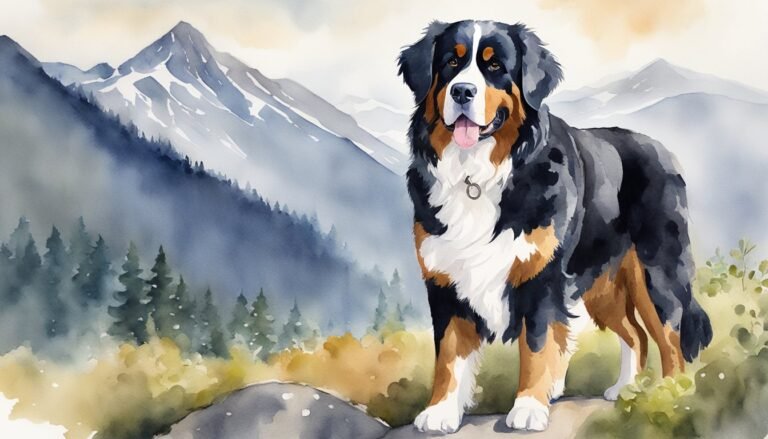
Thinking about getting a Bernese Mountain Dog? These big, fluffy dogs are known for their gentle nature and striking looks.
Before you bring one home, it’s important to learn about their needs and traits.
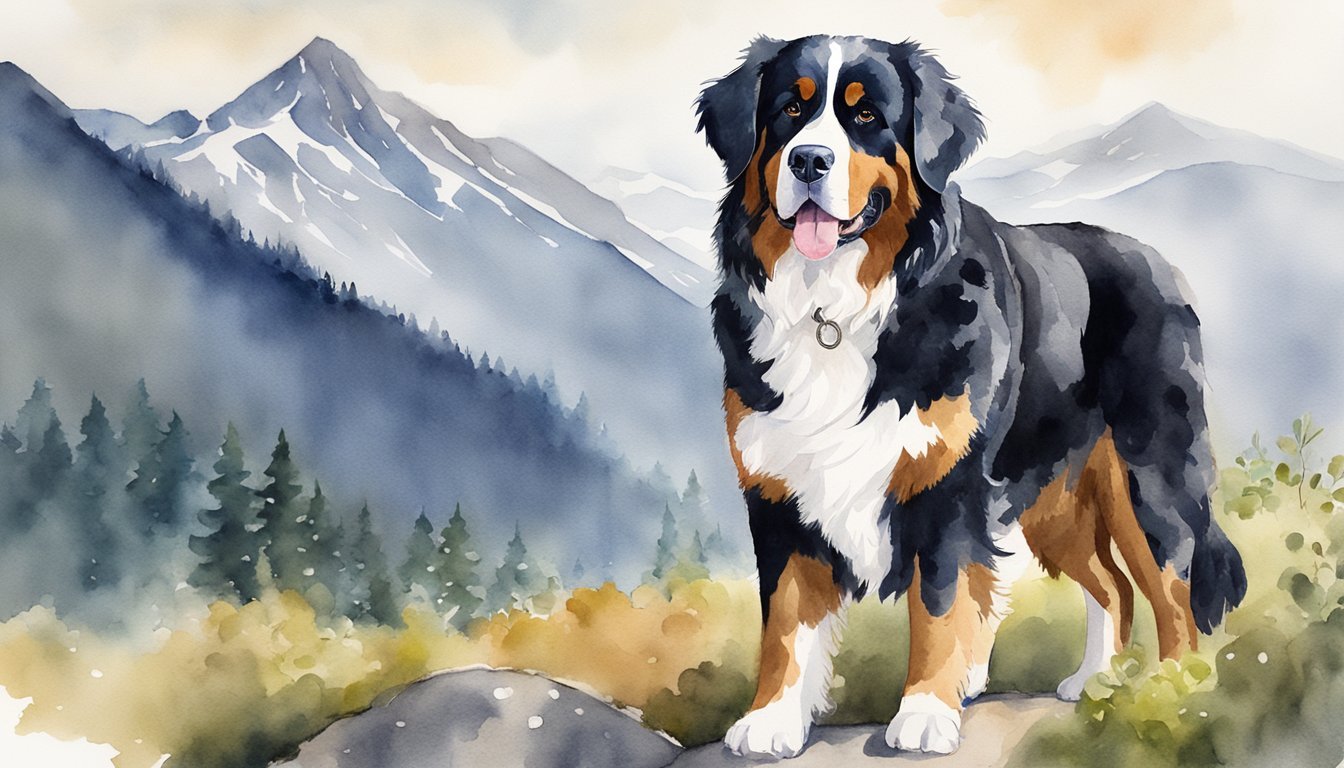
Bernese Mountain Dogs can make great pets for the right families, but they have some unique care requirements. From their size and exercise needs to their grooming and health concerns, there’s a lot to think about.
This guide will cover 10 key things you should know to help you decide if a Berner is the right dog for you.
1) Intelligent and Loyal Companions
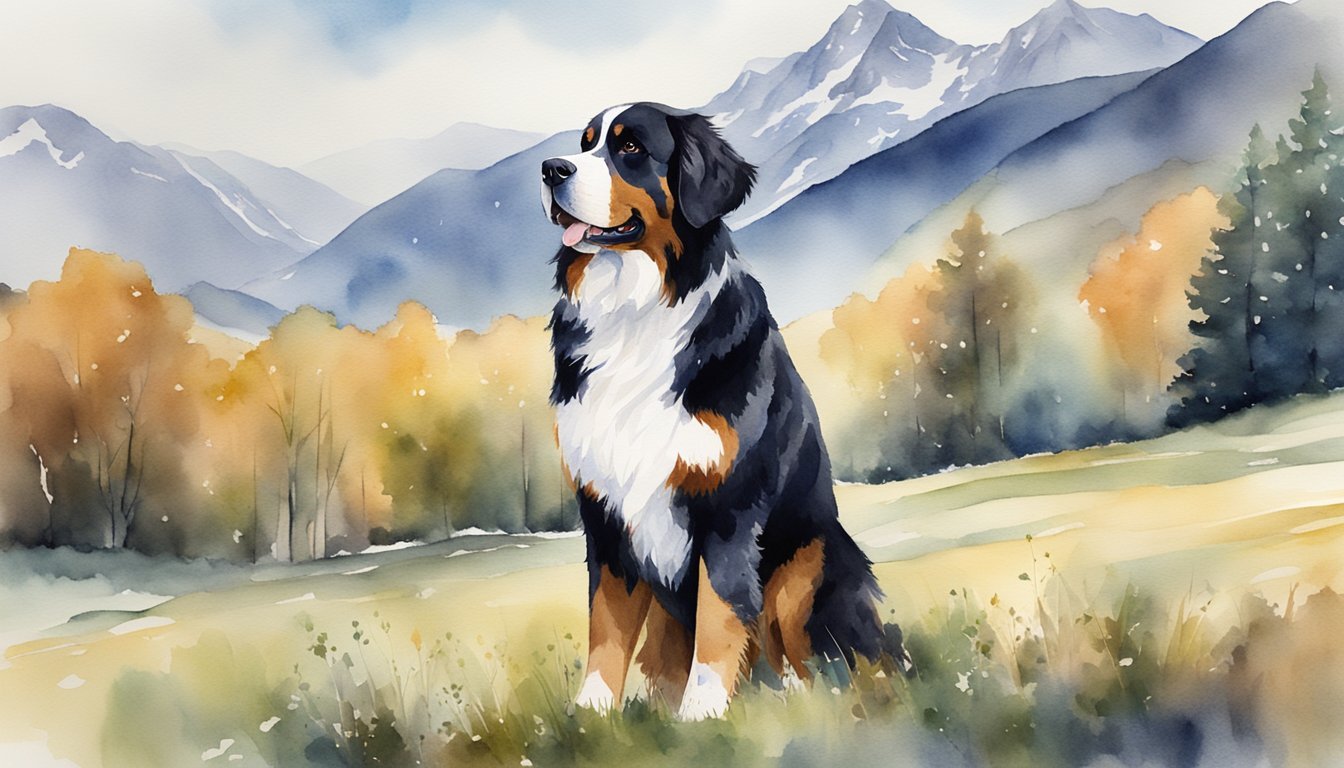
Bernese Mountain Dogs are smart and devoted pets.
They rank 27th out of 138 dog breeds for intelligence.
This means they can learn new commands quickly and easily.
These dogs are eager to please their owners.
They form strong bonds with their families and want to make you happy.
This makes training them easier and more enjoyable.
Berners have a gentle nature that makes them great family dogs.
They’re patient with kids and get along well with other pets when raised together.
You’ll find your Bernese Mountain Dog to be very affectionate.
They love spending time with their people and will often try to be near you.
This breed craves human interaction.
Their loyalty means they can be protective of their family.
With proper socialization, they’ll be friendly to strangers while still keeping an eye out for you.
Bernese Mountain Dogs are working dogs at heart.
They enjoy having jobs to do and learning new tasks.
This keeps their minds active and happy.
Remember that these dogs need plenty of attention.
If left alone too long, they may develop unwanted behaviors.
Make sure you have time to give them the companionship they crave.
2) Require Regular Grooming
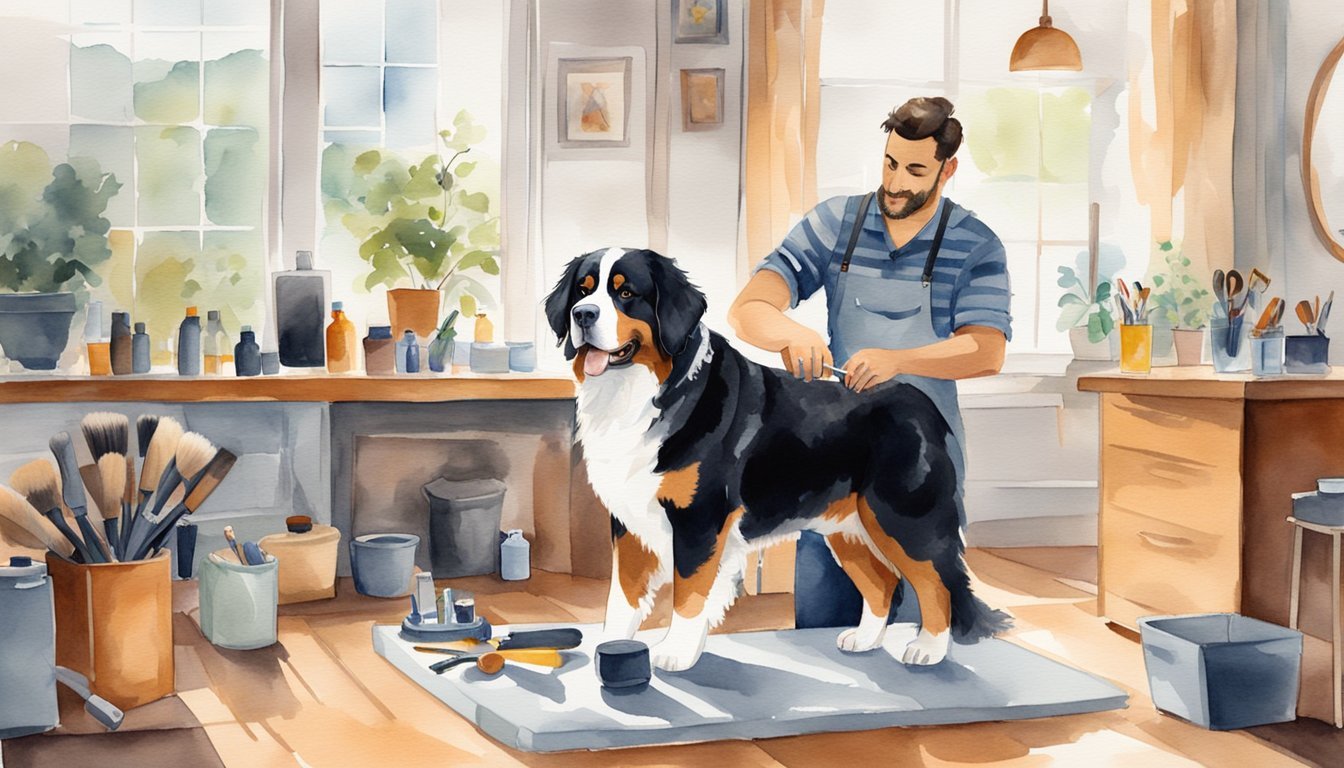
Bernese Mountain Dogs have thick, long coats that need regular care.
You’ll need to brush your dog at least two times a week to keep their fur healthy and tangle-free.
These dogs shed a lot, especially during spring and fall.
Daily brushing may be needed during heavy shedding seasons to control loose hair.
You’ll want to use the right tools for grooming.
A slicker brush and rake comb are good choices for their thick coats.
These help remove dead hair and prevent matting.
Pay extra attention to areas like the chest, belly, and inner thighs when brushing.
These spots tend to tangle more easily.
Bathing your Bernese Mountain Dog every few months is usually enough.
They don’t need frequent baths unless they get very dirty.
Don’t forget about other grooming tasks.
Trim the fur between their paw pads regularly.
This helps prevent slipping on smooth floors.
Brush your dog’s teeth several times a week to maintain good dental health.
Regular nail trims are also important to keep your pet comfortable.
Remember, grooming isn’t just about looks.
It’s a chance to check for any skin issues or unusual bumps.
Regular grooming helps you spot health problems early.
3) Have a Short Lifespan
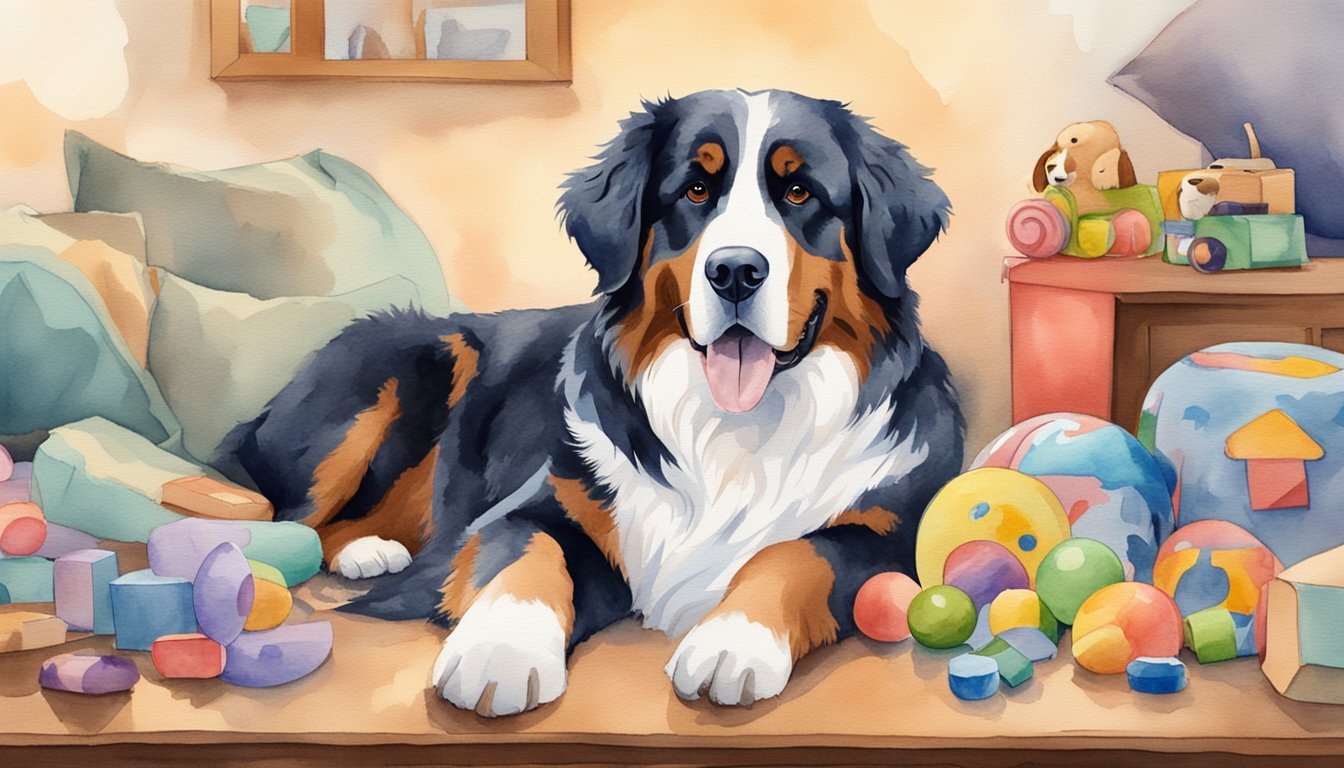
Bernese Mountain Dogs have a shorter life expectancy compared to many other breeds.
On average, they live for 6 to 8 years.
This is important to consider before bringing one into your family.
Their short lifespan is partly due to their large size.
Big dogs often don’t live as long as smaller ones.
A Danish study found the average Bernese Mountain Dog lives about 7.1 years.
Genetic factors play a role in their lifespan too.
These dogs can be prone to certain health issues that affect how long they live.
Cancer is a big concern for the breed.
You should be aware that their short lives are linked to their fast growth rate.
They grow quickly when young, which can put stress on their bodies.
Breeders are working to improve the breed’s health.
But some problems, like joint issues, are still common.
These health challenges can impact how long your dog might live.
Remember, every dog is unique.
Some Bernese Mountain Dogs may live longer than average with good care.
Others might have shorter lives due to health problems.
When you choose this breed, be prepared for a shorter time together.
Make the most of the years you have by giving your dog the best care possible.
4) Prone to Certain Health Issues
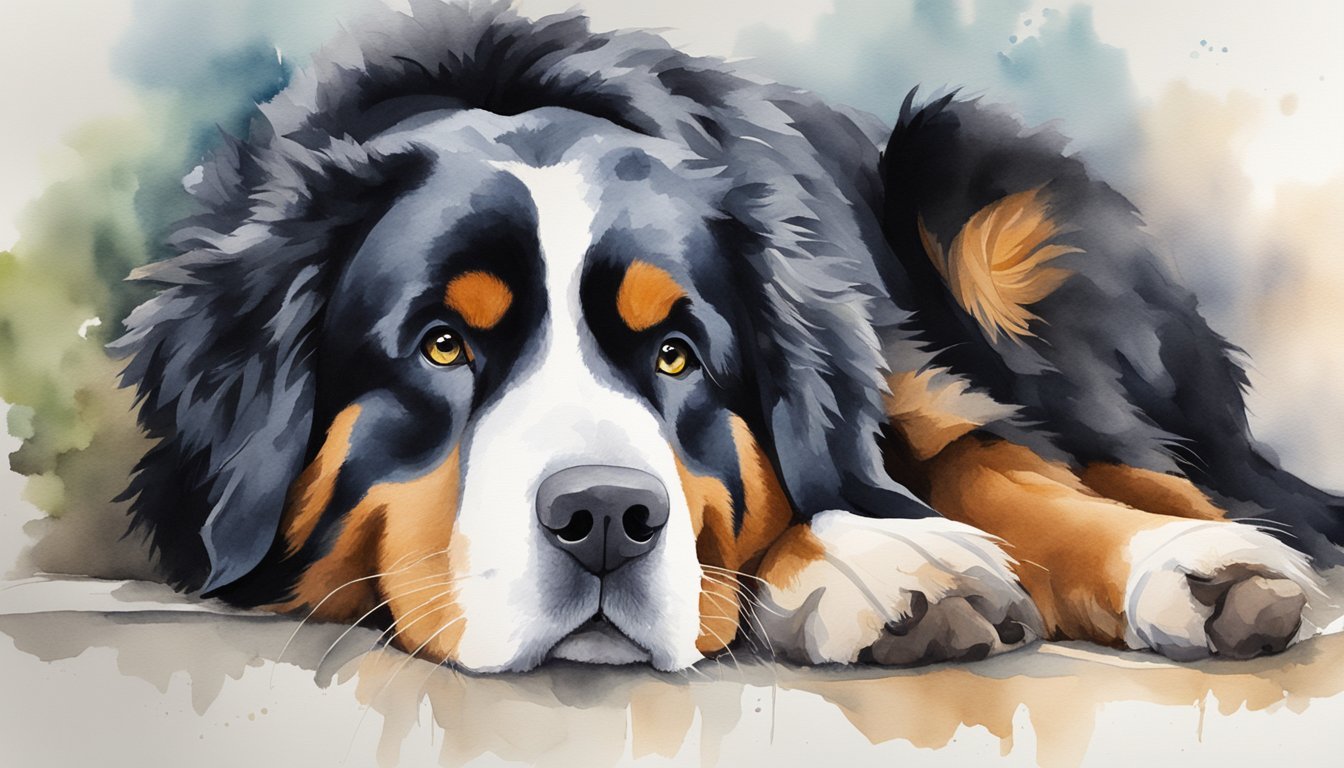
Bernese Mountain Dogs can face some health problems.
You should know about these issues before getting one.
Hip dysplasia is common in Berners.
This condition affects the hip joint and can cause pain and mobility issues. Regular vet check-ups can help catch this early.
Cancer is another concern for this breed. Histiocytic sarcoma is a type of cancer that Berners often get.
It’s important to watch for any unusual lumps or changes in your dog’s health.
Elbow dysplasia can also affect Bernese Mountain Dogs.
This joint problem can lead to lameness and arthritis if not treated.
Bloat is a serious condition to watch out for.
It happens when the stomach fills with gas and twists.
This is an emergency that needs quick vet care.
Eye problems like cataracts can occur in Berners.
Regular eye exams can help catch these issues early.
Food allergies might affect some Bernese Mountain Dogs.
Signs can include diarrhea and ear infections.
A change in diet often helps.
Bernese Mountain Dogs usually live 6-10 years.
This shorter lifespan is partly due to their health issues.
Good care and regular vet visits can help your Berner live a happy, healthy life.
5) Need Plenty of Exercise
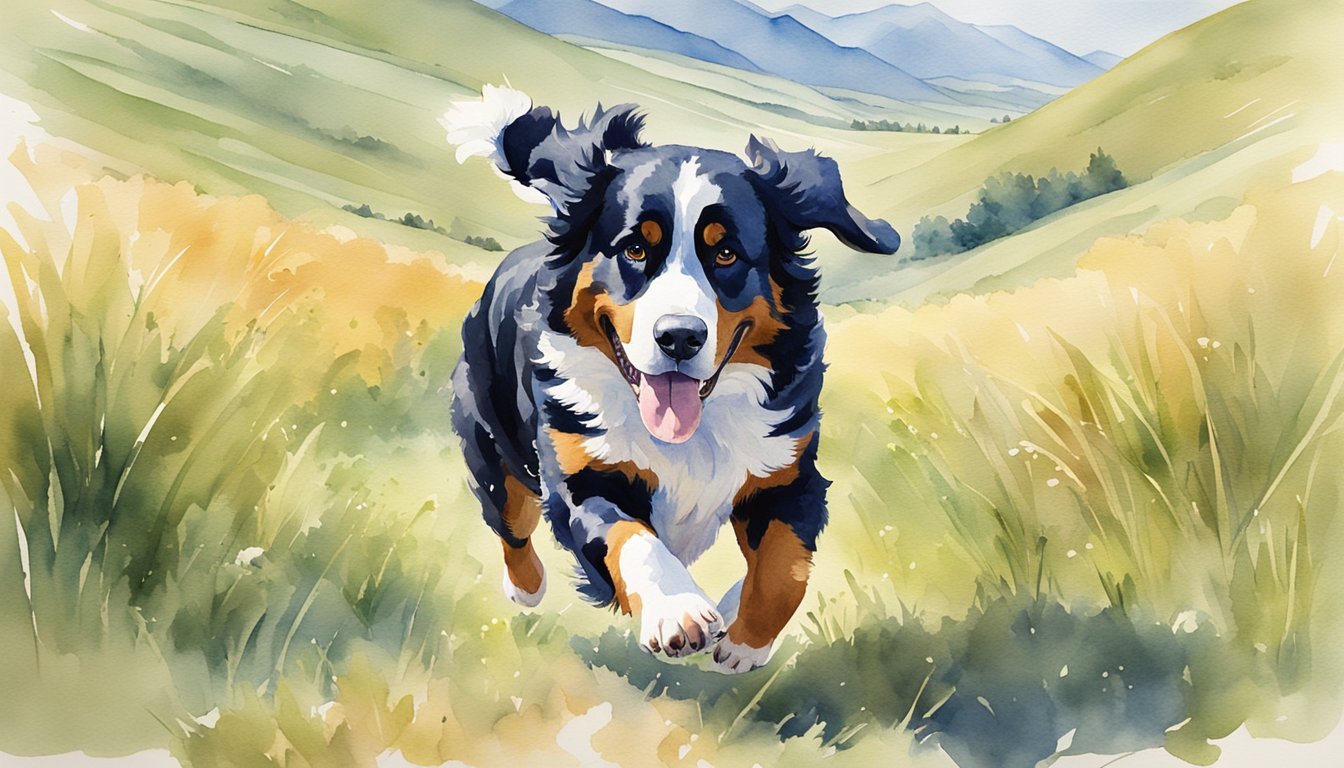
Bernese Mountain Dogs require regular exercise to stay healthy and happy.
You should plan for at least 1 hour of activity daily for your Berner.
These large dogs enjoy walks, hikes, and playtime in a fenced yard.
You can split their exercise into shorter sessions throughout the day.
Berners have a working dog background, so they like having jobs to do.
Giving them tasks during exercise keeps them mentally stimulated.
Gentle activities like walking and swimming are great for Bernese Mountain Dogs.
These low-impact exercises are easier on their joints.
You should avoid intense exercise in hot weather.
Berners have thick coats and can overheat easily.
Exercise them in cooler parts of the day when possible.
Puppies need less structured exercise than adult dogs.
Let them play and explore at their own pace to protect their developing joints.
As your Berner ages, you may need to adjust their exercise routine.
Older dogs may prefer shorter, easier walks to maintain their health.
Remember that every dog is different.
Pay attention to your Bernese Mountain Dog’s energy levels and adjust their exercise as needed.
6) Great with Families and Kids
Bernese Mountain Dogs are excellent family pets.
Their gentle nature and patient disposition make them ideal companions for households with children.
These dogs have a calm temperament that allows them to handle the energy of kids well.
You’ll find that your Bernese Mountain Dog can tolerate energetic children who may want to play with or climb on them.
Their large size is actually a benefit when it comes to kids.
Bernese Mountain Dogs are sturdy enough to withstand accidental rough play without getting hurt or reacting negatively.
You’ll appreciate how these dogs seem to understand the need to be extra gentle around small children.
They often act as protective guardians for the youngest family members.
Bernese Mountain Dogs also have a strong desire to please their owners.
This trait makes them eager to follow rules and behave well around all family members, including kids.
Remember that while these dogs are great with families, they still need proper training and socialization.
Teaching your children how to interact respectfully with the dog is also important.
With their affectionate nature, Bernese Mountain Dogs often form strong bonds with all family members.
You can expect your furry friend to want to be involved in family activities and spend time with everyone.
7) Can Be Stubborn
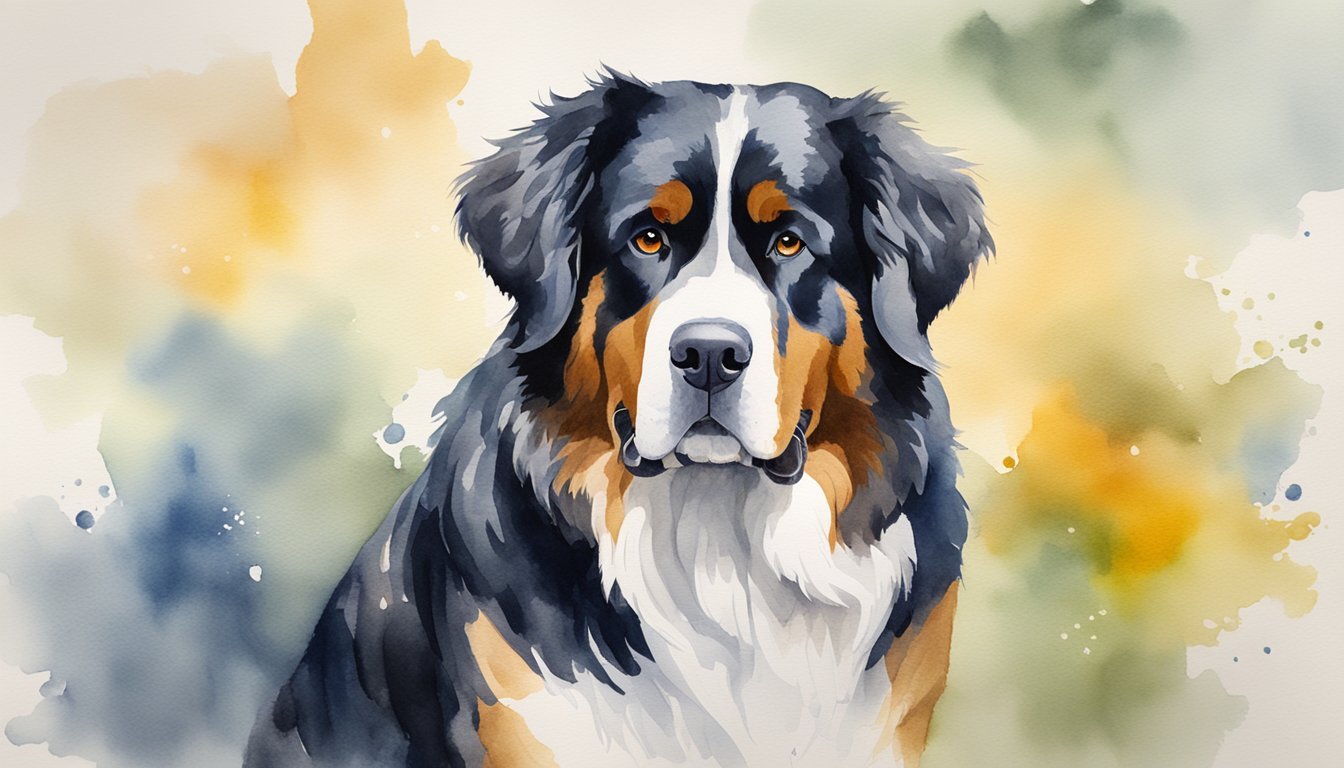
Bernese Mountain Dogs can have a stubborn streak.
This trait comes from their history as working dogs who needed to think independently.
You might find your Berner ignoring commands they know well.
This is not because they’re dumb.
They’re smart dogs who sometimes choose not to listen.
Training a Bernese Mountain Dog takes patience.
You’ll need to be consistent and firm, but never harsh. Positive reinforcement works best with this breed.
Start training your Berner early.
Puppy classes can help socialize them and teach basic obedience.
The sooner you start, the easier it will be to manage their stubborn side.
Remember that Berners are sensitive dogs.
Yelling or punishment can make them shut down.
Instead, use treats and praise to motivate them.
Be prepared for some frustrating moments during training.
Your Berner might decide to do their own thing instead of following your lead.
Don’t give up when faced with their stubbornness.
Stay calm and keep training sessions short and fun.
This will help keep your dog engaged and willing to learn.
With time and effort, you can channel your Berner’s stubborn nature into a positive trait.
Their independent thinking can make them great problem solvers when properly trained.
8) Very Social Dogs
Bernese Mountain Dogs are known for their friendly nature.
They love being around people and other pets.
This makes them great family dogs.
You’ll find that your Berner wants to be part of everything you do.
They’ll follow you from room to room and always be ready for attention.
These dogs don’t do well when left alone for long periods.
They can become anxious or sad without companionship.
If you work long hours, a Bernese Mountain Dog might not be the best choice for you.
Berners are good with children and other pets when properly socialized.
They’re gentle giants who often don’t realize their size.
This means they might accidentally knock over small children while playing.
Your Bernese Mountain Dog will need regular socialization.
Take them to dog parks, on walks, and to meet new people.
This helps them stay well-behaved and confident.
Remember, these dogs can be a bit shy with strangers at first.
But with proper introductions, they quickly warm up to new people.
If you’re looking for a constant companion, a Bernese Mountain Dog might be perfect for you.
They’ll always be ready for cuddles, playtime, or just hanging out by your side.
9) Love Cold Weather
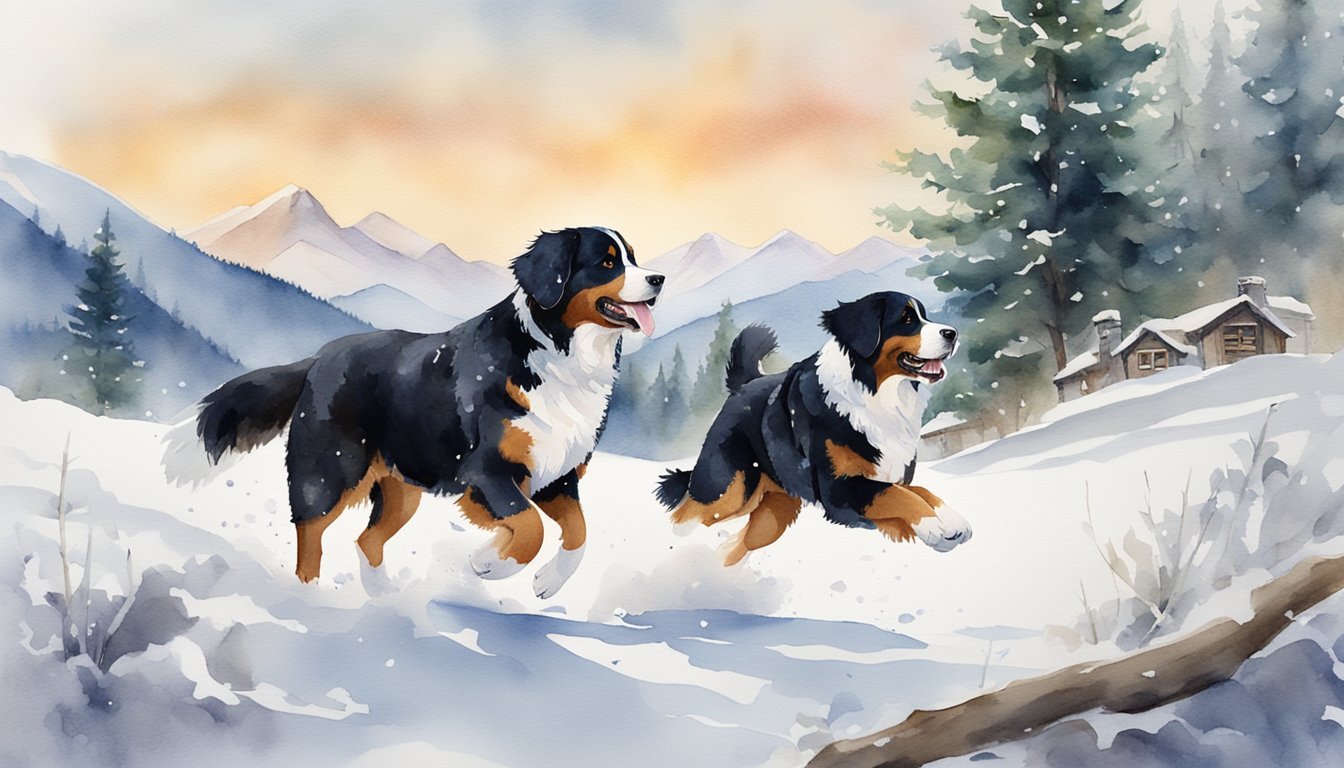
Bernese Mountain Dogs thrive in cool climates.
Their thick double coat keeps them warm in chilly temperatures.
These dogs originated in the Swiss mountains and are well-suited for similar environments.
You’ll find your Berner loves playing in the snow.
Their dense undercoat and longer outer coat provide excellent insulation.
This natural adaptation to cold weather means they can enjoy outdoor activities even when it’s frosty.
Keep in mind that Berners need regular exercise, regardless of the weather.
They require at least two 45-minute walks or runs each day.
Cold weather won’t slow them down, so be prepared for outdoor fun year-round.
While they love the cold, Bernese Mountain Dogs can still get too chilly.
Make sure to provide shelter if they’re outside for extended periods.
Also, watch for signs of discomfort in extreme cold.
If you live in a warmer climate, you’ll need to take extra care.
Berners can overheat easily due to their thick coats.
Provide plenty of shade and water, and limit outdoor activities during hot weather.
10) Shedding Can Be a Challenge
Bernese Mountain Dogs have thick, beautiful coats that shed a lot.
You’ll need to be ready for regular grooming and cleaning to keep your home fur-free.
These dogs have a double coat that sheds year-round.
They shed even more during spring and fall when they “blow” their coats.
You’ll need to brush your Berner 2-3 times a week to keep shedding under control.
During heavy shedding seasons, daily brushing might be needed.
This helps remove loose fur and prevents matting.
It also spreads natural oils through the coat, keeping it healthy and shiny.
Vacuuming regularly will be a must.
You might want to invest in a good quality vacuum cleaner designed for pet hair.
Washable furniture covers can also help trap loose fur and make cleaning easier.
Grooming your Berner outside can help keep fur out of your house.
This is especially useful during heavy shedding periods.
You might also want to keep lint rollers handy for quick clean-ups.
While shedding can be managed, it’s important to know it’s a natural part of owning a Bernese Mountain Dog.
If you’re not ready for some extra cleaning, this breed might not be the best fit for you.
History And Origin
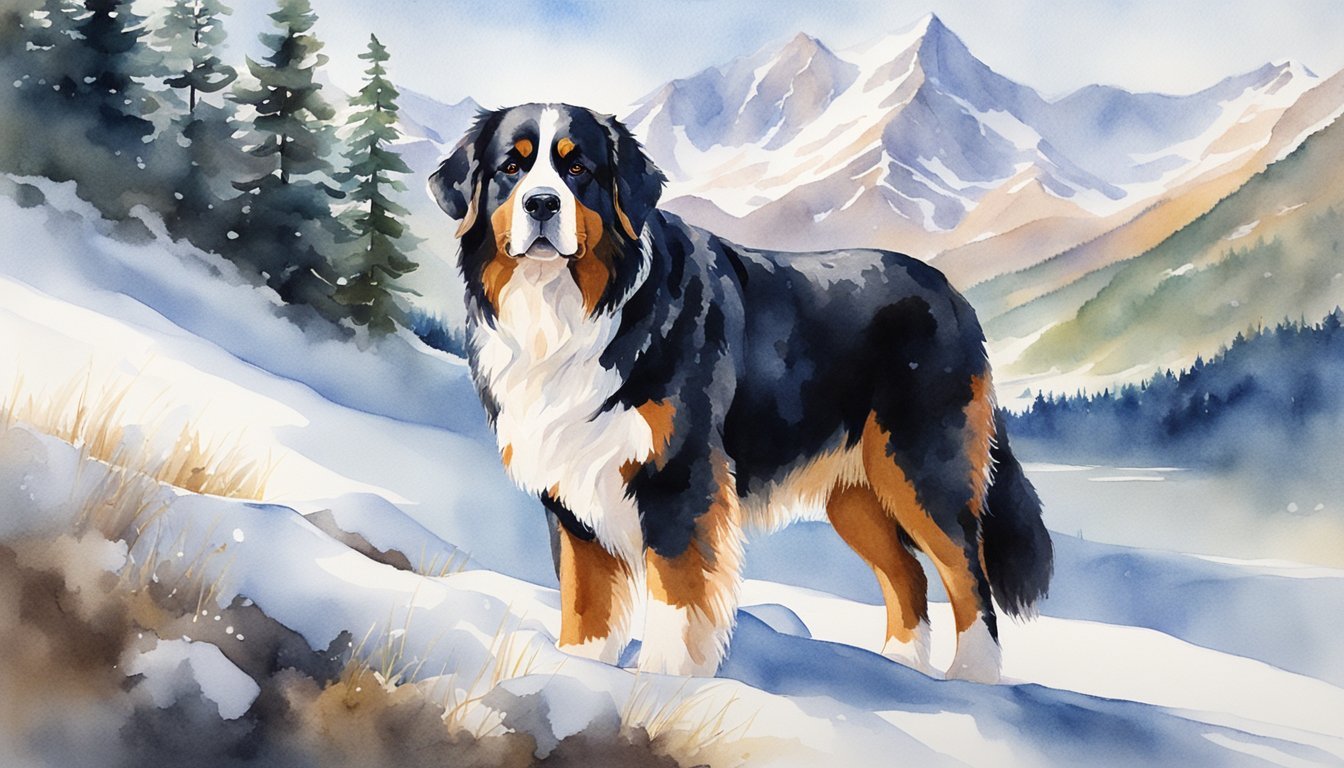
The Bernese Mountain Dog has deep roots in Switzerland.
This breed has a rich history as a working dog before becoming a beloved family pet.
Ancestral Roles
Bernese Mountain Dogs come from the Swiss Alps.
They were bred to work on mountainous terrain, herding cattle and pulling carts.
Their strength and size made them perfect for farm work.
These dogs guarded property and moved livestock.
They also pulled heavy loads in carts.
This work shaped their muscular build and calm temperament.
Development Of The Breed
The breed got its name from the Canton of Bern in Switzerland.
In the late 1800s, dog fanciers worked to save the breed when farm mechanization threatened its existence.
They set breeding standards and promoted the dogs.
This helped increase their numbers.
The breed came to the U.S. in the early 1900s.
Over time, breeders refined the Bernese Mountain Dog’s traits.
They focused on its gentle nature and striking looks.
This turned the working dog into a popular family pet and show dog.
Proper Care And Maintenance

Bernese Mountain Dogs need regular grooming and a balanced diet.
These big, fluffy dogs require specific care to keep them healthy and happy.
Grooming Needs
Bernese Mountain Dogs have a thick double coat that sheds a lot.
You should brush your Berner at least 2-3 times a week to remove loose fur and prevent matting.
During shedding seasons in spring and fall, daily brushing may be needed.
Use a slicker brush and metal comb to reach through the coat.
Bathe your Berner every 6-8 weeks or when dirty.
Trim their nails monthly and clean their ears weekly to prevent infections.
Check and clean their teeth regularly.
Professional grooming every few months can help maintain their coat.
Nutrition Requirements
Feed your Bernese Mountain Dog a high-quality diet made for large breeds.
Puppies need food designed for large-breed growth to support proper development.
Adult Berners typically need 3-4 cups of food daily, split into two meals.
Adjust amounts based on age, weight, and activity level. Avoid overfeeding to prevent obesity, which can strain their joints.
Choose foods with meat as the first ingredient.
Look for options with glucosamine and chondroitin to support joint health.
Fresh water should always be available.
Physical And Mental Exercise
Bernese Mountain Dogs need regular exercise and mental stimulation to stay healthy and happy.
Proper activity helps prevent boredom and keeps them physically fit.
Daily Activity Needs
Bernese Mountain Dogs require 30 to 60 minutes of exercise daily.
This can include walks, hikes, or playtime in a fenced yard.
Start with shorter sessions for puppies and gradually increase as they grow.
Adult dogs can handle longer, more intense workouts.
Swimming is a great low-impact option, especially for older dogs.
Always supervise water activities.
In hot weather, exercise early morning or evening to avoid overheating.
These dogs have thick coats and don’t tolerate heat well.
Mental Stimulation Techniques
Mental exercise is just as important as physical activity for Bernese Mountain Dogs. Puzzle toys and interactive games keep their minds sharp.
Try hide-and-seek games with treats or toys.
This taps into their natural scenting abilities.
Teach new tricks or commands regularly.
Short, fun training sessions provide mental stimulation.
Rotate toys to maintain interest.
Introduce new textures and sounds to keep things exciting.
Consider agility or obedience training.
These activities challenge both body and mind.
Socializing with other dogs and people also provides mental stimulation.
Always supervise interactions to ensure safety.






